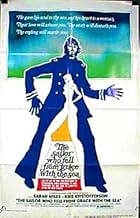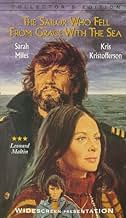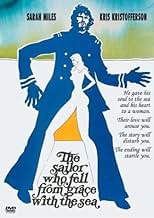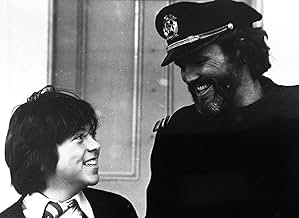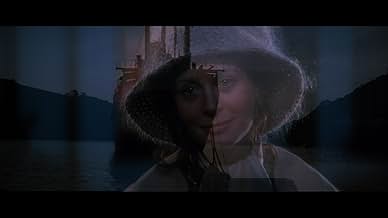Le marin qui abandonna la mer
Titre original : The Sailor Who Fell from Grace with the Sea
NOTE IMDb
6,2/10
1,8 k
MA NOTE
Ajouter une intrigue dans votre langueAfter his father dies, a disturbed young boy plots to take revenge on the new man in his mother's life.After his father dies, a disturbed young boy plots to take revenge on the new man in his mother's life.After his father dies, a disturbed young boy plots to take revenge on the new man in his mother's life.
- Réalisation
- Scénario
- Casting principal
- Récompenses
- 2 nominations au total
Charles Adey-Grey
- Man in Tea Room
- (non crédité)
Mabel Etherington
- Woman in Tea Room
- (non crédité)
Juba Kennerley
- Man in Tea Room
- (non crédité)
Avis à la une
An unforgettable and profoundly disturbing story centered on a widow, Anne, and her only son, Jonathan, in a remote English seaside town. Jonathan belongs to a gang led by a precociously intelligent sociopath known only as Chief, who through sheer force of will and intellect, indoctrinates them with a quasi-Neitzchean philosophy of ultimate superiority and the non-existence of morality. When Kris Kristofferson's Captain Jim arrives in town, and strikes up a passionate relationship with the lonely Anne, Jonathan sees him as a heroic masculine prototype, removed from society and living a 'true' life on the open sea. But when the Captain decides to settle down and marry Anne, Jonathan takes it as an ultimate and unforgivable betrayal, and exacts a terrible revenge.
Based on the 1963 Mishima novel, "The Sailor Who Fell From Grace With The Sea" hints at many themes, from Jonathan's Oedipal obsession with spying on his mother's bedroom to his physical admiration of the Captain that verges on latent homosexuality. The atmosphere, masterfully created by veteran cinematographer Douglas Slocombe, is one of darkly brooding clouds, gray seas, and an air that constantly threatens rain. The (in)famous sex scenes are really not that explicit, and the casual violence exhibited by the children is far more shocking than any glimpse of breast or buttock.
The film, for all its brilliantly evocative atmosphere, excellent performances, and quietly brooding menace, is not without its flaws. The score is terrible, all mawkish piano and sickly clarinet. It is often overly intrusive and distracts from the overall sense of ripe stillness that director Carlino conjures throughout the film. But in general, the film is a remarkable experience, and one that any viewer is unlikely to forget quickly.
Based on the 1963 Mishima novel, "The Sailor Who Fell From Grace With The Sea" hints at many themes, from Jonathan's Oedipal obsession with spying on his mother's bedroom to his physical admiration of the Captain that verges on latent homosexuality. The atmosphere, masterfully created by veteran cinematographer Douglas Slocombe, is one of darkly brooding clouds, gray seas, and an air that constantly threatens rain. The (in)famous sex scenes are really not that explicit, and the casual violence exhibited by the children is far more shocking than any glimpse of breast or buttock.
The film, for all its brilliantly evocative atmosphere, excellent performances, and quietly brooding menace, is not without its flaws. The score is terrible, all mawkish piano and sickly clarinet. It is often overly intrusive and distracts from the overall sense of ripe stillness that director Carlino conjures throughout the film. But in general, the film is a remarkable experience, and one that any viewer is unlikely to forget quickly.
A spooky 'erotic' romantic thriller, with undertones and imagery of both THE INNOCENTS and LORD OF THE FLIES and even RYANS DAUGHTER this film had a bit of a notorious reputation in the late 70s because of the peephole sex scenes and the all too graphic mutilation of the family cat. Plenty of seniors went stampeding from the cinemas gasping especially after the cat got the chop, hissing and howling. The sight of Sarah Miles masturbating gave a us all a kooky preview to WHITE MISCHIEF made ten years later. There has been plenty of criticism about the translation of this Japanese novel into the foggy coast of Dover, but really it does not matter because the almost MOONSPINNERS-like spooky seaside look adds to what is genuinely an usual and compelling romantic drama with deeply strange and uneasy subplot about the wrath of destructive misguided young boys. Kris Kristofferson was every woman's preferred seaman in the 70s! Then Babs snared him in her horrible remake of A STAR IS BORN. SAILOR was a big hit in its day and deserves another look. It is eerie and romantic and quite dangerous. You almost expect Sarah Miles to narrate (all REBECCA-like) "last night I dreamed I went to masturbate...." I saw it on a double with CABARET. Those were the days!
This movie is morbid but is quite faithful to the original story. And it uses its Dover location very effectively in showing a place isolated in its own mythology.
The story is about a fatherless adolescent boy who is himself very much like the sea. He is restless and calm and seemingly untameable. All the confusion and frustrations of adolescence are portrayed here in an honesty that no other movie has ever dared to show. The restless urge to be a grown up and to move on to a life of daring excitement, and the desire to find a philosophy and a poetry to which one can ascribe are all explored in an uncompromising way in this film.
Desperate for an authority and leadership that he can look up to, the boy finds himself vying for the acceptance of a sadistic boy with a Nietzsche complex who uses a strain of hierarchy in his little band of friends in order to maintain control. Soon Kristofferson shows up and as he seems to be the stuff of oceanic legends, the boy finds a new hero to worship.
I would not even attempt to give the ending away. Suffice it to say that this is a most disturbing film in its subject matter and for those with short attention spans, it may seem slow in its pace. But like the sea, the film is languid in its pacing and it promises the same degree of poetry and savagery.
Fascinating viewing!
The story is about a fatherless adolescent boy who is himself very much like the sea. He is restless and calm and seemingly untameable. All the confusion and frustrations of adolescence are portrayed here in an honesty that no other movie has ever dared to show. The restless urge to be a grown up and to move on to a life of daring excitement, and the desire to find a philosophy and a poetry to which one can ascribe are all explored in an uncompromising way in this film.
Desperate for an authority and leadership that he can look up to, the boy finds himself vying for the acceptance of a sadistic boy with a Nietzsche complex who uses a strain of hierarchy in his little band of friends in order to maintain control. Soon Kristofferson shows up and as he seems to be the stuff of oceanic legends, the boy finds a new hero to worship.
I would not even attempt to give the ending away. Suffice it to say that this is a most disturbing film in its subject matter and for those with short attention spans, it may seem slow in its pace. But like the sea, the film is languid in its pacing and it promises the same degree of poetry and savagery.
Fascinating viewing!
It's a compelling, morbid film most of the time - but what's up with the ending? It builds up (competently and suspensefully) to a situation that can easily be guessed right from the beginning, and then....it just stops, as if being afraid of going "too far". Perhaps the novel ends the same way, but in this movie it doesn't work - it renders the whole film pointless. The hyped-up erotic scenes are brief and too darkly photographed, but the performances are right on target. (**1/2)
The movie is indeed an adaptation of a novel by Yukio Mishima. Just to clarify, the novel is not an obscure work. Mishima is amongst Japan's most famous writers and was nominated for the Nobel Prize for Literature three times. Also, the plot of the original Japanese story does not happen in a remote fishing village; it happens in Yokohama, which is one of Japan's largest cities. Lastly, it does not happen in feudal Japan, a fact that would be very evident had someone read the book.
Now that that's been said, I've watched the movie since I very much enjoyed the novel. While I agree with most comments concerning the movie itself, I actually very much enjoyed the ending. Not only would have supplying an ending would have been taking too much liberty, but also it allows the viewer to imagine what would happen. Furthermore, to challenge another commenter, this sort of ending does work in movies and was a common motif of films during this era. Some other notable movies with endings similar to this include Francis Ford Coppola's "The Conversation" and "Parallax View."
Now that that's been said, I've watched the movie since I very much enjoyed the novel. While I agree with most comments concerning the movie itself, I actually very much enjoyed the ending. Not only would have supplying an ending would have been taking too much liberty, but also it allows the viewer to imagine what would happen. Furthermore, to challenge another commenter, this sort of ending does work in movies and was a common motif of films during this era. Some other notable movies with endings similar to this include Francis Ford Coppola's "The Conversation" and "Parallax View."
Le saviez-vous
- AnecdotesFirst English language filmed adaptation of a novel by Japanese writer Yukio Mishima.
- Versions alternativesUS DVD version is cut. Sex scenes of Sarah Miles are tamed down in US version.
- ConnexionsReferenced in Fantasm Comes Again (1977)
Meilleurs choix
Connectez-vous pour évaluer et suivre la liste de favoris afin de recevoir des recommandations personnalisées
- How long is The Sailor Who Fell from Grace with the Sea?Alimenté par Alexa
Détails
- Date de sortie
- Pays d’origine
- Langue
- Aussi connu sous le nom de
- The Sailor Who Fell from Grace with the Sea
- Lieux de tournage
- Sociétés de production
- Voir plus de crédits d'entreprise sur IMDbPro
Contribuer à cette page
Suggérer une modification ou ajouter du contenu manquant

Lacune principale
By what name was Le marin qui abandonna la mer (1976) officially released in India in English?
Répondre

